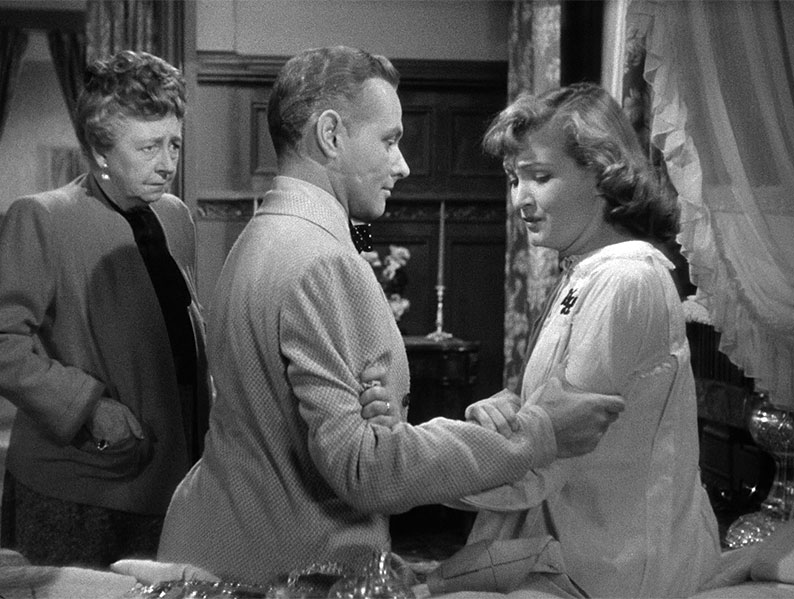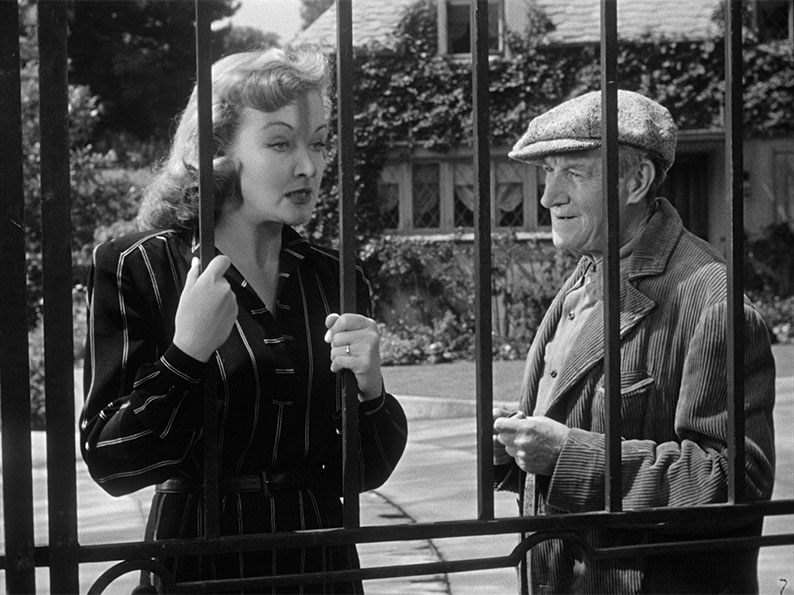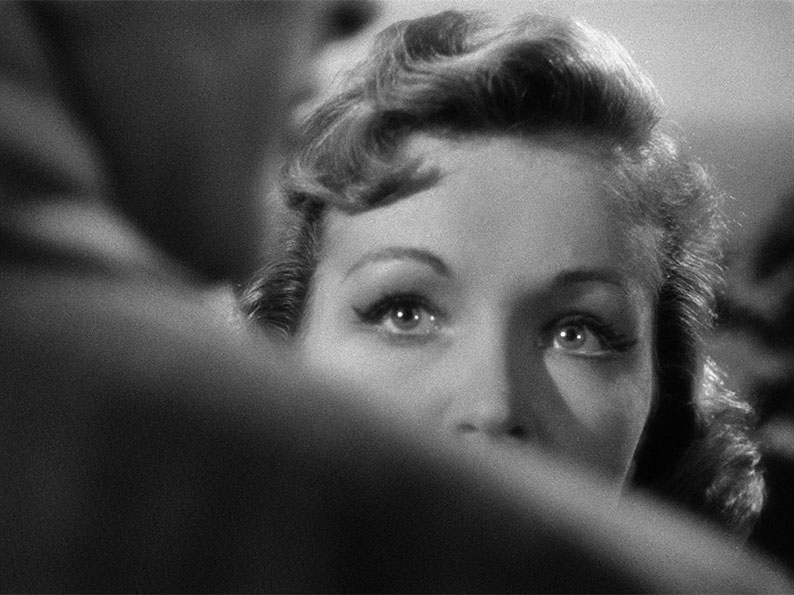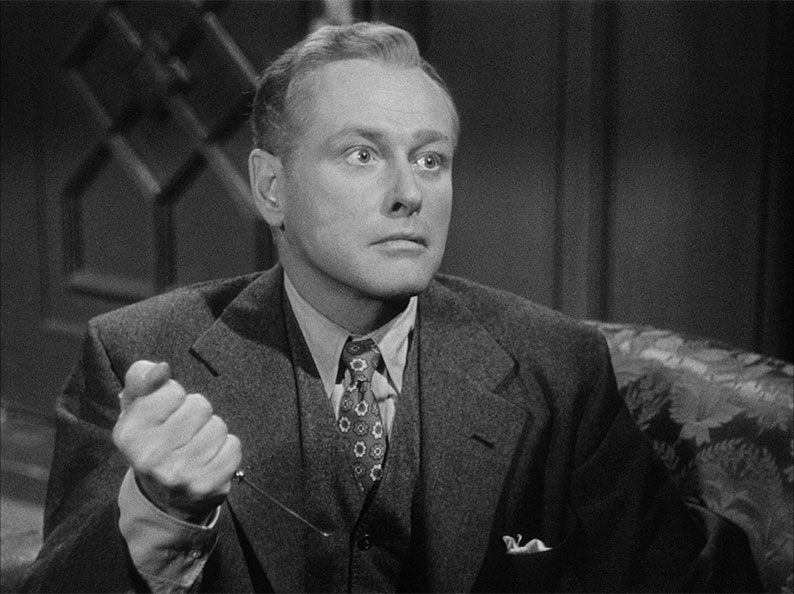|
As a title, My Name is Julia Ross may not seem to tell you much about the film that it fronts, specifying nothing about the plot or even the genre in which it sits, yet seasoned film devotees should be able to draw a reasonably accurate inference from it nonetheless. It is, after all, a proclamation of the sort you only make if the perceived need arises to inform others of a fact that they were unaware of, or remind them of something that they seem to have forgotten or are wilfully choosing to ignore. Of course, it could be a display of power-fuelled arrogance, a shout of authority based on your own perception of your lofty status, but this film was made back in 1945 and Julia Ross is not Gordon Gekko. For me, the inference was clear from the moment I first laid eyes on that title, that the Julia Ross in question was proclaiming her true identity because others were convinced that she was somebody else. I was so close...
The film begins intriguingly as we follow a rain-drenched woman into the London boarding house in which she is staying and I do mean follow – the camera watches her from behind as she crosses the street and then moves into the hallway of the house with her in a trio of shots that almost seem framed to conceal her identity, a subtle bit of foreshadowing of things to come. Here she encounters the sort of surly Londoner you often found in American films of the period in the shape of cleaner Bertha (an uncredited Joy Harington), and in the two-and-a-half-minutes we spend in the two women’s company, an impressive amount of information is subtly imparted. The name and address on a letter reveal that the previously unidentified woman is the titular Julia Ross (a terrific performance from the oft-undervalued Nina Foch), and in the course of the conversation she has with Bertha we learn that she has recently moved to London from Surrey, that she is looking for work but has been advised to avoid manual labour after an appendix operation and that she’s three weeks behind on her rent. We also discover that she had a bit of a thing for a former lodger named Dennis Bruce (Roland Varno), who left to marry his Scottish fiancé, a wedding that Julia was invited to but missed because the invitation has arrived a day late. Then, as Julia browses the job ads in the newspaper, she spots one for a new employment agency and heads straight there in the hope of landing one of the secretarial jobs on offer.

The Agency is run by a prissy woman named Sparkes (Anita Sharp-Bolster) who, after laying out a few of the conditions she clearly doesn’t think a woman like Julia could meet, decides that she may be perfect after all for the position of secretary to a woman named Mrs. Hughes (Dame May Whitty), who is looking for someone who could fulfil the role for at least a year and not suddenly pack the job in to deal with a family crisis or get married as her predecessors have. It turns out that Julia has no boyfriend or siblings and her parents are deceased, so when Mrs. Hughes pops in with her adult son Ralph (George Macready) to interview her in person, she is able to convince her that she is the woman for the job, which she is offered on the spot. There’s just one thing, it’s a live-in position, but the kindly Mrs. Hughes sweetens the deal by giving Julia a cash advance to go shopping for anything she might need. All is not what it first seems, however. On reaching the Hughes house, Julia is shown to her room and after she has fallen into a drug-assisted sleep, Ralph and his mother dispose of her clothing and possessions. By the time Julia wakes up, two days have passed she’s been transported to a house on the Cornish coast and is being addressed by everyone as Ralph’s mentally fragile wife, Marion Hughes.
A popular strain of the psychological thriller in the 1940s involved films in which a woman was gradually and unknowingly terrorised in her own home by a husband who turns out to be not what he seemed. One of the most notable and popular of these was George Cukor’s 1944 film adaptation of Patrick Hamilton’s successful stage play Gaslight, in which a woman falls for and marries a man who psychologically manipulates her into believing that she is losing her mind, a film and play from which we get the term ‘gaslighting’. There’s little doubt that My Name is Julia Ross takes its inspiration from these films but differs from them in significant ways. Where the victim is usually the wife of a tormentor she has fallen in love with after a whirlwind romance, Julia is effectively kidnapped and kept prisoner not just by the man who claims to be her husband, but his mother and two of their associates as well. Gun Crazy director Joseph H. Lewis and screenwriter Muriel Roy Bolton (adapting the 1941 novel The Woman in Red by Lucy Beatrice Malleson, who wrote under the pen name of Anthony Gilbert) also quickly dispense with the idea of keeping the audience guessing about whether Julia might in fact be the deluded Marion’s alter ego. “She’s perfect,” says Mrs. Hughes to her son just seconds after Julia has left the employment office, to which Ralph smilingly responds, “There’s even a small resemblance.” The tension thus springs not from whether Julia is really Marion after all but what the Hughes family’s plans are for her and how or even if she will escape their clutches, particularly once we are clued into the fact that Ralph has a dangerously psychopathic streak.

What’s particularly impressive about Julia as the story’s tormented victim is that she’s so strong-willed, and almost from the moment she wakes up in Marion’s nightdress and is addressed as Ralph’s wife by well-meaning housemaid Alice (Queenie Leonard, also uncredited), she defiantly proclaims her true identity and demands to know what Ralph and his mother are up to. Similarly, when an attempt by Ralph the following night to scare her into the breakdown he’s been telling others that she has suffered – a sequence that briefly takes the film into psychological horror territory – concludes with the discovery of a cat that has no business being in her room in the first place, Julia quickly surmises that there must be a secret entrance and sets about searching for it, and doesn’t give up after a failed first attempt.
That there’s a good chance Julia will survive this ordeal and eventually escape her captors is set up when she returns from her job interview to find Dennis back in his room after his wedding was cancelled at the last minute (“She didn’t like it when I kept calling her Julia”) and the two make a date for the following evening, one Julia is unable to keep because she is by then in unconscious transit to Cornwall. Yet as a potential knight in shining armour, Dennis is handicapped by a trail that ends abruptly at the house to which Julia has been spirited away from by the time he pops by to find out why she didn’t show up for their date. Indeed, the film does a solid job of throwing plausible obstacles in his path and ensuring that even if he was aware of Julia’s predicament, he would be in no position to do anything about it.
As the victim of domestic imprisonment and a scheme that she can initially only guess at and later has good reason to fear for her life over, Julia proves easy to sympathise and even identify with. Her defiant resistance and pragmatic approach to escape attempts had me rooting for her from the off, and the niggling worry at the back of my mind that noir-tinted thrillers of the period didn’t always end happily guaranteed a groan of frustration on my part every time a new plan to flee or alert others to her predicament stumbled and fell. This peaks in her plan to post a secret letter to Dennis, an attempt to put one over on her captors that has more twists than some lesser films have in their entirety and is probably the best wind-up in a movie that really is bristling with them.

Funded and originally programmed as a B-feature, My Name is Julia Ross crams a solid 90 minutes of plot into an extraordinarily compact and waste-free 65 minutes of screen time. A tightly structured screenplay, believable dialogue and a string of fine performances all help to sell every twist as plausible (there’s a late-film exchange between two characters over the availability of a room, for example, whose dialogue and delivery don’t have a false note), and while the misfit of an ending has studio interference written all over it, this fails to make a serious dent in this otherwise terrific little gothic noir drama that really is ripe for rediscovery.
Not having access to the booklet that will accompany the first pressing of the commercial release of Arrow Academy’s Blu-ray, I’m not sure who was responsible for the restoration of My Name is Julia Ross, but whoever it is, they deserve a Hulk-sized pat on the back. This is one of those restorations that is so good that it makes the film look almost as if it was shot last year rather than 74 years ago. The 1.33:1 1080p transfer is sharp without any trace of edge enhancement, while the contrast and tonal range are beautifully balanced, with solid blacks and not loss of shadow detail. Dust and dirt have been removed, there’s no trace of any former damage. A fine and consistent film grain is visible throughout. Lovely.
The Linear PCM 2.0 mono soundtrack has the expected range restrictions for a film of this vintage, but is otherwise surprisingly robust, with clear reproduction of dialogue and music, no evident damage and only the faintest trace of background fluff.
Optional English subtitles for the deaf and hearing impaired are available.
Audio Commentary by Alan K. Rode
Noir expert Alan K. Rode, author Michael Curtiz: A Life in Film and Charles McGraw, Film Noir Tough Guy, makes the actors and the filmmakers the focus of his interesting and often educational commentary. More than once he pulls director Joseph H. Lewis up for telling tall stories about his own achievements, but also highlights the things that mark him as a director of considerable note. It was also here that I learned (and I can’t believe that I didn’t know this before) that George Macready was close friends with Vincent Price and that the two opened a small art gallery together. The occasional doofus-in-a-cinema comments on the action I could do without, but they are thankfully few and far between.

Identity Crisis: Joseph H. Lewis at Columbia (21:36)
Nora Fiore, who writes about film at The Nitrate Diva, examines the film and its production in engaging detail, with particular focus on the work of its director, Joseph H. Lewis, whose early career she also usefully outlines. She also has some serious issues with the ending.
Theatrical Trailer (1:37)
Unsurprising trailer with some serious spoilers.
Also included with the first pressing is an Illustrated Collector's Booklet featuring new writing on the film by author and critic Adrian Martin, but this was not available for review.
An economic 65 tightly-wound minutes of tense, noir-tinted drama, My Name is Julia Ross is a most worthy release for Arrow’s prestigious Arrow Academy label. The film may be short and the special features few in number, but we’re definitely talking quality over quantity here, and in that respect both the film and the disc shine, particularly in the quality of the restoration and transfer. Highly recommended.
|